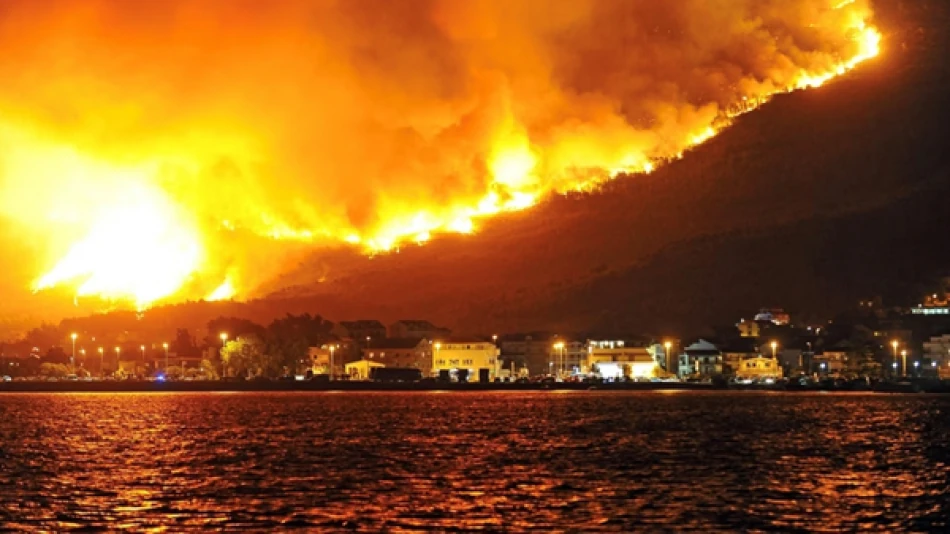
Raging Wildfires Ravage Southern Europe's Forests: A Concerning Environmental Crisis
Southern Europe Burns: Heat Wave Fuels Devastating Wildfires Across Multiple Nations
A relentless heat wave gripping southern Europe has triggered widespread wildfires across Greece, Spain, and Albania, forcing thousands to evacuate their homes and threatening critical infrastructure. The crisis underscores Europe's growing vulnerability to extreme weather events, with temperatures reaching 45°C in Spain and fires overwhelming emergency services across the region.
Greece Faces Industrial and Tourism Threats
In Greece, the situation has reached critical levels as flames engulfed a cement factory near Patras, west of Athens. The massive blaze has torn through olive groves and forests while disrupting railway operations, highlighting the economic toll beyond immediate safety concerns.
Authorities ordered the evacuation of approximately 7,700 residents from a town near Patras on Tuesday, followed by additional evacuation warnings for two nearby villages on Wednesday. The scale of displacement reflects the fire's rapid spread and the government's acknowledgment that current containment efforts are insufficient.
Tourism Industry Under Pressure
The crisis has extended to Greece's vital tourism sector, with fires threatening the popular islands of Chios in the east and Cephalonia in the west. Authorities have relocated tourists and residents to safer areas, potentially disrupting peak summer season revenue that Greece's economy heavily depends on.
This pattern mirrors similar disruptions seen in previous years across Mediterranean tourist destinations, from Turkey's 2021 resort fires to Portugal's recurring summer blazes, suggesting a new normal for the region's tourism industry.
Spain Records Casualties Amid Extreme Conditions
Spain's situation has turned deadly, with a volunteer firefighter dying from severe burns while several others required hospitalization. The country's meteorological agency has issued warnings that virtually the entire nation faces severe to extremely high fire risk.
The Spanish heat wave, now in its tenth day, peaked at 45°C on Tuesday and is expected to continue until next Monday, potentially making it one of the longest recorded heat waves in the country's history. Firefighters have extinguished blazes that consumed homes and warehouses across villages in the Castile and León region, where over 5,000 people were evacuated.
Infrastructure and Economic Impact
The widespread nature of Spain's fires demonstrates how extreme weather events can simultaneously stress multiple regions, stretching emergency resources thin and creating cascading economic effects. The agricultural sector, already facing drought conditions, now confronts direct fire damage to crops and livestock.
Regional Pattern Emerges Across Balkans
Albania's Defense Minister Piro Vengu characterized this as a "critical week," with major forest fires blazing across the country. While residents of the southern city of Delvina have returned home after earlier evacuations, authorities remain on high alert.
The simultaneous crisis across multiple Balkan and Mediterranean nations suggests that current firefighting capabilities and early warning systems may be inadequate for the scale of climate-driven emergencies becoming increasingly common in the region.
Climate Adaptation Challenges
These fires represent more than isolated disasters—they signal a fundamental shift in southern Europe's risk profile. The combination of prolonged heat waves, drought conditions, and strong winds creates perfect conditions for rapid fire spread that traditional firefighting methods struggle to contain.
European Union emergency response mechanisms are being tested as multiple member states simultaneously request assistance, raising questions about the bloc's capacity to handle concurrent climate emergencies. The economic costs, from tourism losses to infrastructure damage and agricultural destruction, will likely prompt renewed discussions about climate adaptation investments and cross-border emergency cooperation.
The current crisis may accelerate policy discussions about land use planning, building codes in fire-prone areas, and the need for enhanced early warning systems across the Mediterranean basin.
Most Viewed News

 Layla Al Mansoori
Layla Al Mansoori






